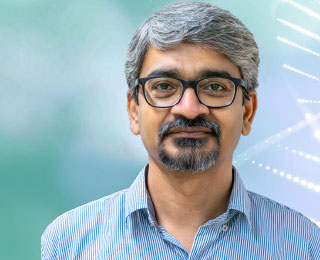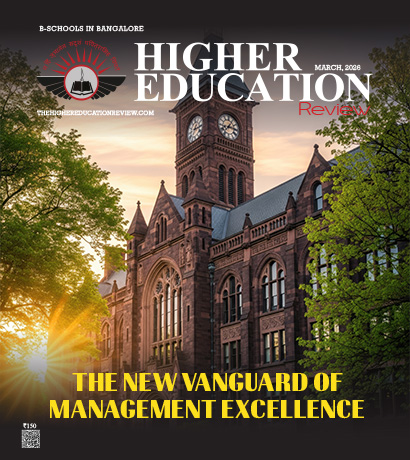NIIT University (NU): Creating a Holistic Academic Space Conducive to Biotech Education

Dr Sanjeev Kumar, HoD (Biotechnology & Bioinformatics), NIIT University (NU)
The Indian biotechnology market is registering a CAGR of 13.74 percent which will continue until 2033, according to reports. India’s bio economy has witnessed a remarkable growth over the past decade, growing to 165.7 billion dollars last year. The exponential surge in growth is attributed to the government’s effort to boost the economical sustainability and innovation through biotechnology.
The nation aims to advance towards becoming a global-hub for bio-manufacturing in the forecast period. Hence, it focuses on strengthening the foundation for robust R&D activities and building a resilient industrial eco-system regarding biotech. While biotech is being explored as a crucial means to sustainably address environmental challenges and social well-being it raises the imperative to fortify industry-academia linkage.
Such foresighted efforts will make way for increased collaborations between the industry and academic institutions. NIIT University observed the dire need to train competent biotech industry professionals to effectively respond to such a phenomenal industrial transformation. Therefore, the institution took the endeavor to restructure the conventional higher academic learning as a highly industry-intensive knowledge acquisition system.
Established in 2009 by NIIT Ltd, a global leader in IT training and talent development with a presence in over 30 countries, NIIT University (NU) builds on decades of experience in industry-relevant education.
Since its inception, NU has evolved into a comprehensive academic institution offering undergraduate, postgraduate, and doctoral programs in fields such as computer science and biotechnology. Designed to foster research, innovation, and industry-aligned learning, the university aims to serve as a catalyst for cutting-edge knowledge and practical application.
Located on a state-of-the-art campus, NU is founded on four core principles, namely sustainability, research, technology, and industry-linked, seamless education, forming the bedrock of its academic and institutional philosophy. Their interdisciplinary curriculum of biotechnology and bioinformatics is designed to provide the students with in-depth insights into latest industrial practices. NU’s panoramic learning approaches train the students to be futuristically resilient and independent thinkers.
Courses Offered
The amalgamation of IT and biotechnology is reshaping the modern biotech space with data-driven insights and precision medicine. NU has been responding to the ongoing technological evolution by designing bioinformatics courses, a profound resource for the students to grow as intuitive biotechnologists. The courses educate them with adept knowledge in relevant technology and innovation.
"NU is cultivating a deep research mindset long before graduation"
NU offers several UG, PG and doctoral programs in biotechnology and computer science engineering. The state-of-art research and laboratory infrastructure has a wide-range of equipment including the basic ones as well as high end instruments like multiple PCR machines, -80 degree C freezer, Inverted microscope, anaerobic chamber, RT-PCR, high quality spectrophotometers, High Performance Liquid Chromatography, Gas Chromatography, Atomic Absorption Spectroscope, Animal Cell Incubator, Multiplate Reader and many more.
The instituition believes in the holistic development of the students, therefore, they encourage them in co-curricular activities beyond academic learning. The campus, built in the world’s one of the oldest mountain range Aravalli Hills brags as a learning space amidst nature and imbibes the joy of exploring diverse passions in the students.
The biotechnology students have the freedom to interact with computer science faculty, electronics faculty or Management faculty. NU prioritises on widening the horizon of their knowledge. Right from the first semester, the curriculum ensures that they start working on industry problems.
NU offers a rare, research-driven undergraduate journey where students progressively engage in real-world R&D, cultivating a research mindset long before graduation. In the first semester, students undertake a Capstone Project, which is an integral part of the curriculum designed to address real-world industry challenges.
“They take it forward in the form of an R&D project in the sixth semester, and then further into the seventh semester as the Advanced R&D project. In the eighth semester, students undertake a six-month Industry Practice (IP) or Research Practice (RP) either in an institutional R&D lab or in a corporate setting.
They also have the option to pursue a one-year IP or RP, without affecting the total number of credits or the overall duration of the program”, Dr Sanjeev Kumar, HoD (Biotechnology & Bioinformatics), NU stated.
Future Endeavours
The applications of biotechnological and bioinformatics innovations span a wide range of fields, including healthcare, agriculture, environmental management, and industrial processes, and continue to expand into areas such as energy, food technology, forensic science, and personalized medicine. NU’s divergent academic structure educates the students in accordance with the dynamic values that modern biotechnology creates.
In order to foster futuristic innovation and respond to latest industrial approaches, NU continuously modifies their courses with the help of the industry experts. They are gearing up to bolster their research ecosystem in a more effective manner. Along with the technical education, they are aiming at comprehensive personality development and honing interpersonal skills through various training programs.
“NU is going to introduce a new course called Healthcare Informatics in the arena of bioinformatics. In addition, we are coming up with a more specific pedagogy on sustainability to breathe life into more ideas to tackle future environmental challenges”, Dr Sanjeev concluded.
The nation aims to advance towards becoming a global-hub for bio-manufacturing in the forecast period. Hence, it focuses on strengthening the foundation for robust R&D activities and building a resilient industrial eco-system regarding biotech. While biotech is being explored as a crucial means to sustainably address environmental challenges and social well-being it raises the imperative to fortify industry-academia linkage.
Such foresighted efforts will make way for increased collaborations between the industry and academic institutions. NIIT University observed the dire need to train competent biotech industry professionals to effectively respond to such a phenomenal industrial transformation. Therefore, the institution took the endeavor to restructure the conventional higher academic learning as a highly industry-intensive knowledge acquisition system.
Established in 2009 by NIIT Ltd, a global leader in IT training and talent development with a presence in over 30 countries, NIIT University (NU) builds on decades of experience in industry-relevant education.
Since its inception, NU has evolved into a comprehensive academic institution offering undergraduate, postgraduate, and doctoral programs in fields such as computer science and biotechnology. Designed to foster research, innovation, and industry-aligned learning, the university aims to serve as a catalyst for cutting-edge knowledge and practical application.
Located on a state-of-the-art campus, NU is founded on four core principles, namely sustainability, research, technology, and industry-linked, seamless education, forming the bedrock of its academic and institutional philosophy. Their interdisciplinary curriculum of biotechnology and bioinformatics is designed to provide the students with in-depth insights into latest industrial practices. NU’s panoramic learning approaches train the students to be futuristically resilient and independent thinkers.
Courses Offered
The amalgamation of IT and biotechnology is reshaping the modern biotech space with data-driven insights and precision medicine. NU has been responding to the ongoing technological evolution by designing bioinformatics courses, a profound resource for the students to grow as intuitive biotechnologists. The courses educate them with adept knowledge in relevant technology and innovation.
"NU is cultivating a deep research mindset long before graduation"
NU offers several UG, PG and doctoral programs in biotechnology and computer science engineering. The state-of-art research and laboratory infrastructure has a wide-range of equipment including the basic ones as well as high end instruments like multiple PCR machines, -80 degree C freezer, Inverted microscope, anaerobic chamber, RT-PCR, high quality spectrophotometers, High Performance Liquid Chromatography, Gas Chromatography, Atomic Absorption Spectroscope, Animal Cell Incubator, Multiplate Reader and many more.
The instituition believes in the holistic development of the students, therefore, they encourage them in co-curricular activities beyond academic learning. The campus, built in the world’s one of the oldest mountain range Aravalli Hills brags as a learning space amidst nature and imbibes the joy of exploring diverse passions in the students.
The biotechnology students have the freedom to interact with computer science faculty, electronics faculty or Management faculty. NU prioritises on widening the horizon of their knowledge. Right from the first semester, the curriculum ensures that they start working on industry problems.
NU offers a rare, research-driven undergraduate journey where students progressively engage in real-world R&D, cultivating a research mindset long before graduation. In the first semester, students undertake a Capstone Project, which is an integral part of the curriculum designed to address real-world industry challenges.
“They take it forward in the form of an R&D project in the sixth semester, and then further into the seventh semester as the Advanced R&D project. In the eighth semester, students undertake a six-month Industry Practice (IP) or Research Practice (RP) either in an institutional R&D lab or in a corporate setting.
They also have the option to pursue a one-year IP or RP, without affecting the total number of credits or the overall duration of the program”, Dr Sanjeev Kumar, HoD (Biotechnology & Bioinformatics), NU stated.
Future Endeavours
The applications of biotechnological and bioinformatics innovations span a wide range of fields, including healthcare, agriculture, environmental management, and industrial processes, and continue to expand into areas such as energy, food technology, forensic science, and personalized medicine. NU’s divergent academic structure educates the students in accordance with the dynamic values that modern biotechnology creates.
In order to foster futuristic innovation and respond to latest industrial approaches, NU continuously modifies their courses with the help of the industry experts. They are gearing up to bolster their research ecosystem in a more effective manner. Along with the technical education, they are aiming at comprehensive personality development and honing interpersonal skills through various training programs.
“NU is going to introduce a new course called Healthcare Informatics in the arena of bioinformatics. In addition, we are coming up with a more specific pedagogy on sustainability to breathe life into more ideas to tackle future environmental challenges”, Dr Sanjeev concluded.

